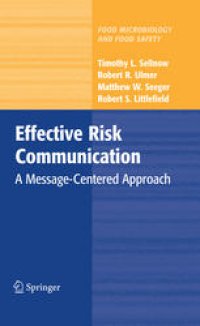
Ebook: Effective Risk Communication: A Message-Centered Approach
- Tags: Food Science, Chemistry/Food Science general, Medicine/Public Health general
- Series: Food Microbiology and Food Safety
- Year: 2009
- Publisher: Springer-Verlag New York
- Edition: 1
- Language: English
- pdf
"As we face the threats and concerns posed by terrorism in a post 9/11 world, risk communication is becoming much more important as an intervention and mitigation strategy. Risk communication is now something that governments, the private sector and other stakeholders need to think about before, during and after a natural or intentional catastrophic event. While intentional contamination of the food supply to cause harm represents some unique challenges due to the personal nature of the threat, the concepts and examples covered in this book extend across potential events to provide a framework for how to begin thinking about the expanded importance of risk communication."
Shaun Kennedy, Director, National Center for Food Protection and Defense
The overlying purpose of this book is to construct a communication based approach to risk communication. In doing so, this book establishes a message-centered focus to risk communication. Section one of the book establishes definitions and parameters of risk communication, identifies the complex audience expectations for risk messages, and introduces a model of best practices for effective risk communication. In section two, the best practices are applied in four robust case studies. Section three includes chapters devoted to developing a mindful approach to risk communication, ethical considerations of risk communication, and a final chapter that discusses future developments of risk communication.
This book is written for practitioners who are charged with creating and delivering risk messages to the general public; instructors who teach the following courses: Food Safety, Public Health, Health Communication, Risk Communication, Political Communication, Emergency Management; and also scholars who write in the areas of risk and crisis communication.
"As we face the threats and concerns posed by terrorism in a post 9/11 world, risk communication is becoming much more important as an intervention and mitigation strategy. Risk communication is now something that governments, the private sector and other stakeholders need to think about before, during and after a natural or intentional catastrophic event. While intentional contamination of the food supply to cause harm represents some unique challenges due to the personal nature of the threat, the concepts and examples covered in this book extend across potential events to provide a framework for how to begin thinking about the expanded importance of risk communication."
Shaun Kennedy, Director, National Center for Food Protection and Defense
The overlying purpose of this book is to construct a communication based approach to risk communication. In doing so, this book establishes a message-centered focus to risk communication. Section one of the book establishes definitions and parameters of risk communication, identifies the complex audience expectations for risk messages, and introduces a model of best practices for effective risk communication. In section two, the best practices are applied in four robust case studies. Section three includes chapters devoted to developing a mindful approach to risk communication, ethical considerations of risk communication, and a final chapter that discusses future developments of risk communication.
This book is written for practitioners who are charged with creating and delivering risk messages to the general public; instructors who teach the following courses: Food Safety, Public Health, Health Communication, Risk Communication, Political Communication, Emergency Management; and also scholars who write in the areas of risk and crisis communication.